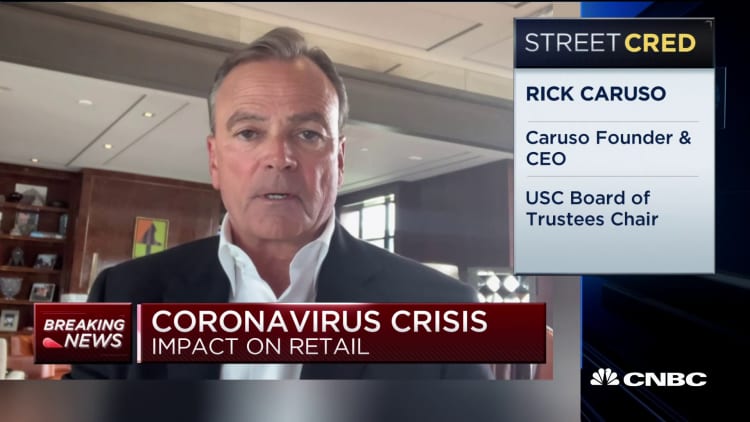A major shopping center owner in the U.S. has taken matters into its own hands to try to help small business owners get access to funds from the federal government and from states that can help them pay rent.
Kimco Realty, which owns and operates roughly 400 strip centers typically anchored by grocery stores across the country, has started piloting a tenant assistance program, or TAP. Its goal is to help its tenants find and apply for federal and state loans. Those loans are meant to aid smaller businesses in surviving the disruption caused by the coronavirus pandemic.
Currently, the TAP pilot is in California and Florida. Kimco said it plans to roll out the program to other states over the next few days.
The launch follows a frenzied rush last Friday for small businesses to file for federal loans. Entrepreneurs are now nervously waiting on bank approvals. The government's $350 billion loan program is aimed at assisting small businesses hurt by the measures that have been taken to stem the spread of COVID-19. But many have described the process as chaotic and confusing. And some are still seeking assistance.
"We were nervous about time. We are not ones to wait for the government. We figured we had to act quickly," Kimco CEO Conor Flynn told CNBC in an interview.
"We recognized early on, that the big national retailers ... they need to pay their rents," Flynn explained, mentioning names like Target, Home Depot and Costco. "They have the balance sheets and the cash positions to weather this storm."
"The small mom-and-pops are the ones in the trenches," the CEO said. "We knew they needed access to capital quickly."
Kimco said it is working with various law firms to help its tenants that are looking for government-sponsored disaster relief loans, at no cost, with Kimco covering the legal expenses.
"If we are funding the legal assistance ... this helps our tenants get to the front of the line," for funds, Flynn said. He said Kimco is looking for additional ways to get capital to the businesses that need it most. Those efforts could be announced by the company in the near future, he said.
Kimco also will offer a rent deferral program to smaller tenants that cannot pay April rent, so long as they are checking all the boxes and applying to the government programs that are available to them, the CEO explained. "This is not a free handout."
But when Flynn gets a phone call from a large, national retailer looking to "game the system," Flynn said, he will not hesitate to default them — or boot them from a lease.
"At some point, I think [these retailers] are going to recognize this is damning to your brand," he said, about well-capitalized companies looking to get out of rent payments. "I think they run a real risk of alienating their customer base," if they do not pay rent when they are financially in a position to do so.
Other landlords including U.S. mall owners Triple Five Group and Taubman have said they have their own obligations to meet, and therefore need to collect rent checks from their tenants.
American Dream co-CEO Don Ghermezian told CNBC in an interview: "The difficulty we are going though now ... if tenants don't want to pay rent, my response is: I have got to pay a mortgage. I borrowed money. I have got to pay back my lenders."
'Let it go and shutter'
For many small-shop owners, a forced rent payment could mean the end of the road for their businesses, or lights out for good.
"The retail industry is still looking for more relief," David Marmins, a retail litigation expert who co-leads Arnall Golden Gregory's retail team, said. "The clients we are dealing with are trying to work out short-term deals with landlords until we know more information."
Marmins is working with one particular daycare owner with two shopping center locations in Virginia. The owner has had two very different conversations with its landlords. One is a larger, corporate entity. And the other is a small business operator itself. The daycare owner, a male, asked to remain anonymous in this story because the negotiations with one landlord remain ongoing and are private.
The smaller landlord has been much more collaborative to come up with a solution for April rent, the daycare owner said in an interview. "They understood. We are working out a payment plan. They are helping us. We both understand that we are helpless right now."
However, the larger landlord "is willing to make some very small concessions. But beyond that, the sympathetic aspect is lacking here," he said. "They are demanding [and] being very assertive."
"As a business owner, the most important aspect you worry about: how long the crisis will last," the owner said. "You contemplate, but you can not predict. You think about the longer impact. You also stay in touch with employees. We don't want them to think because we are closed we don't care about them."
Business at the two daycare locations is now down 85% to 90%, he said. Any influx of revenue hardly covers payroll, and the business has been deferring on everything else — credit card payments, utilities and other expenses, he added.
"If nothing comes through with this one landlord ... [our] last, but not favorable resort, is just let it go and shutter," the owner said. "That is the most difficult decision we will have to make sooner or later."
—CNBC's Kate Rogers contributed to this reporting.



